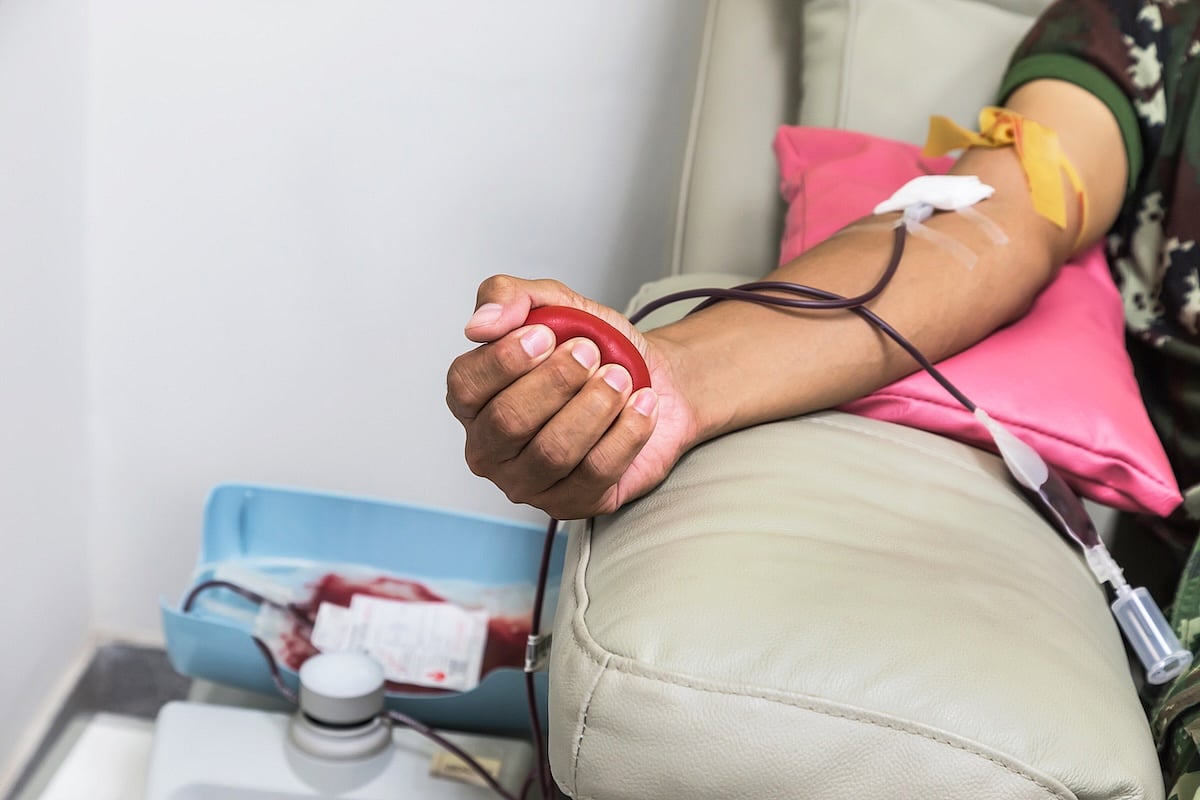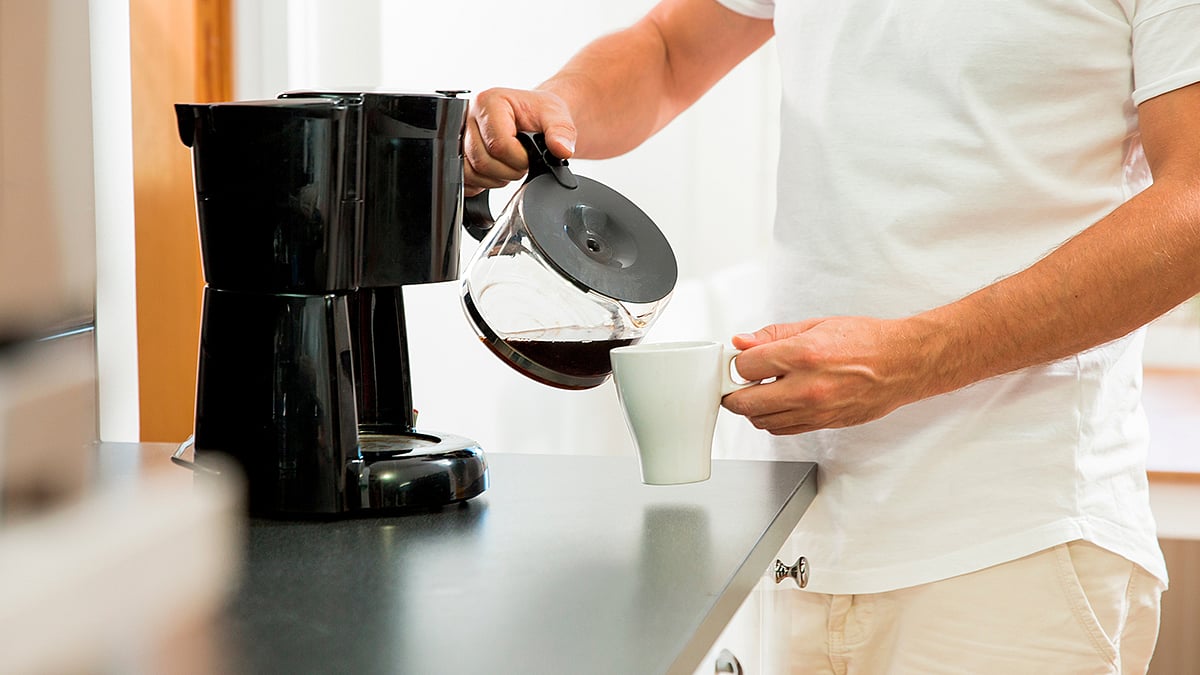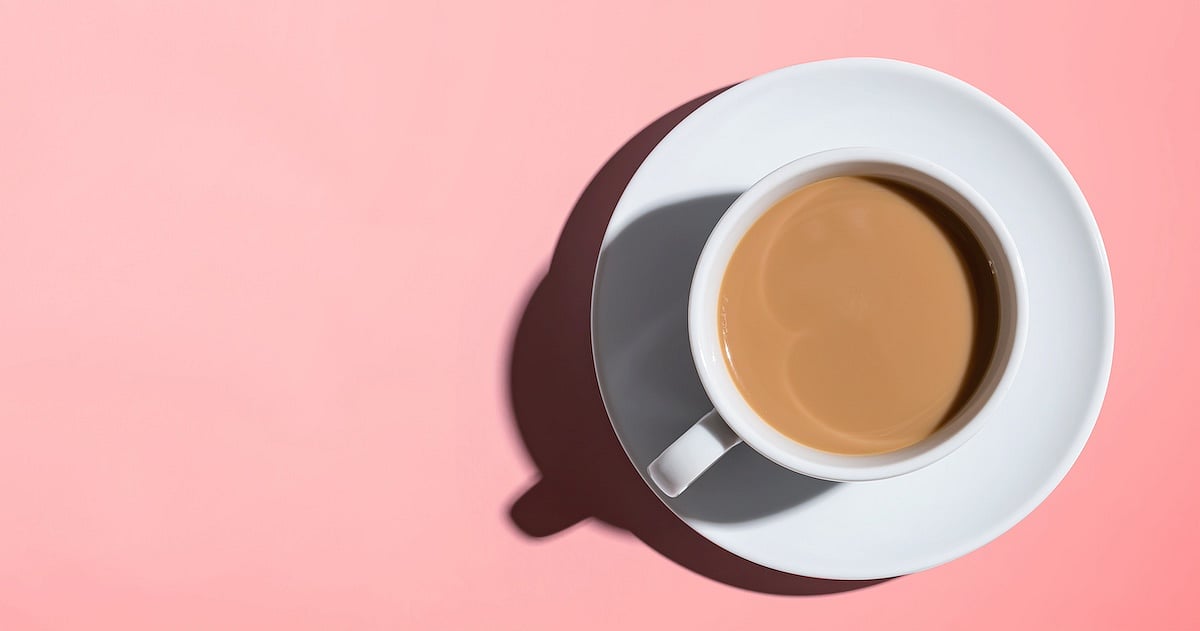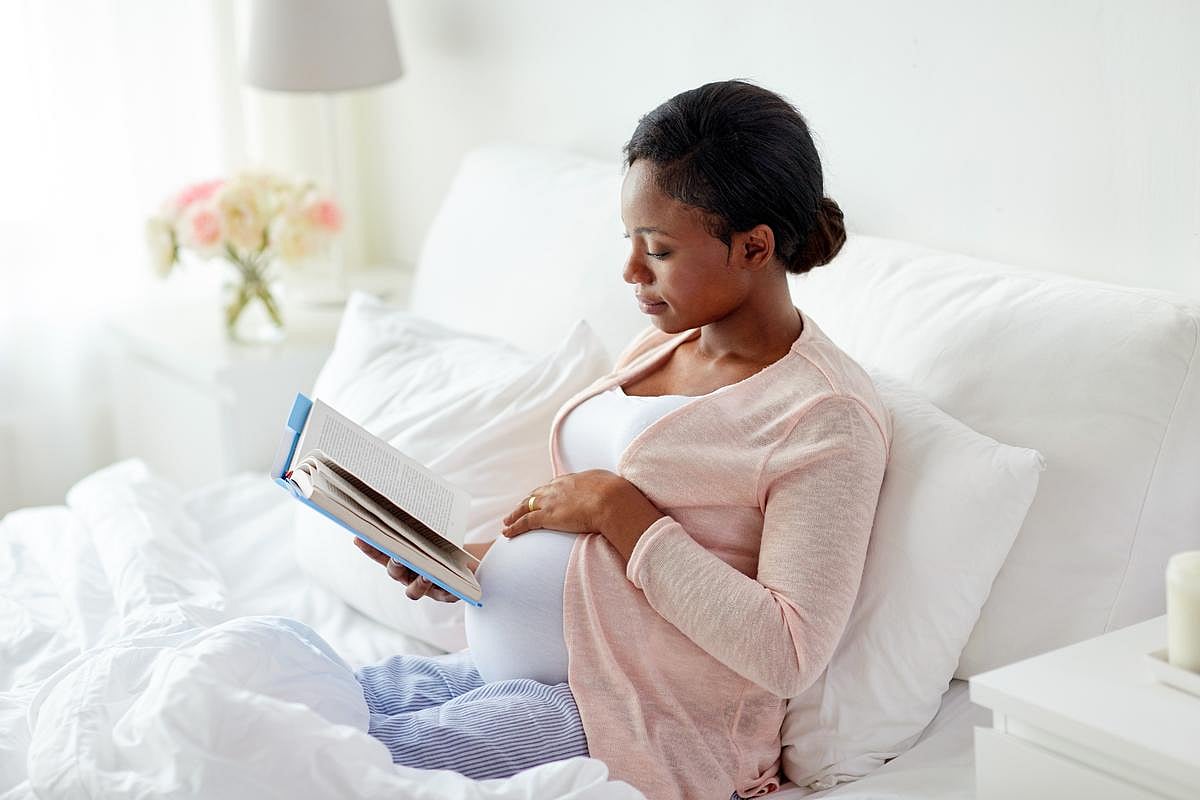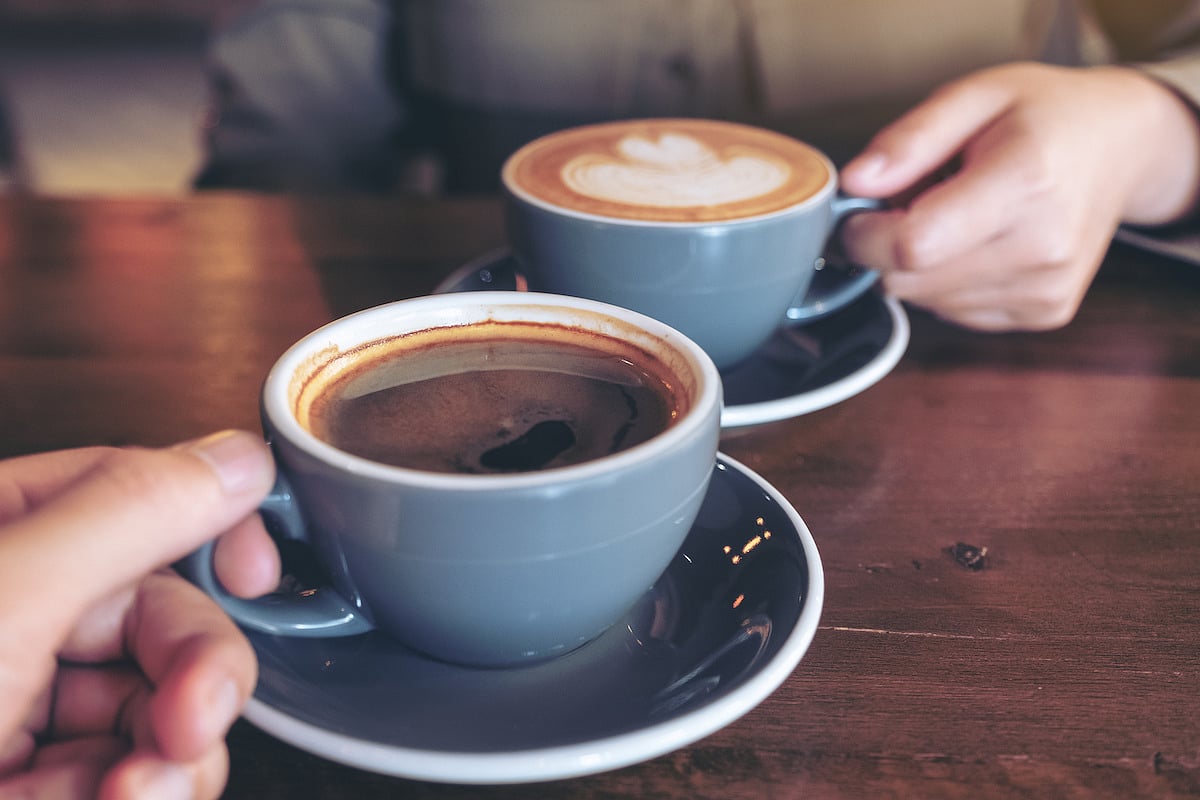Manténgase sano!
41 Resultados de su búsqueda "Caffeine / Coffee / Tea".
Resultados de noticias de salud - 41
A few cups of coffee or tea each day can help your brain age more gracefully, a new study says.
About two to three cups of caffeinated joe — or one to two cups of tea — reduced dementia risk and slowed brain aging, researchers reported Feb. 9 in the
Energy drinks might give you wings, unleash the beast or fuel your grind — but chugging too many might pose a serious stroke risk, doctors warn.
An otherwise fit and healthy man in his 50s with a daily eight-can habit found out the hard way, according to a case study published Dec. 9 in the journal BMJ Case...
- Dennis Thompson HealthDay Reporter
- |
- December 10, 2025
- |
- Página completa
A cup of coffee might actually benefit some people with a common heart rhythm disorder, a new study says.
Adults with atrial fibrillation who drank a daily cup of coffee were 39% less likely to have an episode of irregular heart rhythm, compared to those who a...
- Dennis Thompson HealthDay Reporter
- |
- November 12, 2025
- |
- Página completa
Your morning cup of coffee might harm the quality of a blood donation provided later in the day, a new study says.
Caffeine appears to impair donated blood in ways that reduce the effectiveness of future transfusions, researchers report in the journal Haemotologica.
Specifically, they found that red blood cells are ...
- Dennis Thompson HealthDay Reporter
- |
- September 10, 2025
- |
- Página completa
A morning cup of coffee might do more than momentarily boost your energy and spirits.
Full-test java also appears to help women age more gracefully, a new study says.
Middle-aged women who regularly drank caffeinated coffee were more likely...
- HealthDay Reporter
- Dennis Thompson
- |
- June 4, 2025
- |
- Página completa
Your morning cup of coffee might help you power through the day — but could it be keeping your brain too alert at night, even while you sleep?
A new study suggests that caffeine doesn’t just affect your energy levels. It may also change how your brain functions during sleep, especially in 20-somethings.
Researchers in Canada found that drinking caffeine before bed may ke...
- HealthDay Reporter
- I. Edwards
- |
- June 1, 2025
- |
- Página completa
Turns out, Americans may be drinking less coffee, soda and tea, but they’re getting more caffeine than ever.
A new study of more than 49,000 U.S. adults found that while fewer are sipping caffeinated drinks, those who do are choosing much stronger doses, with coffee taking the lead.
The result? C...
- HealthDay Reporter
- India Edwards
- |
- February 22, 2025
- |
- Página completa
Experiments in sheep are hinting that doses of caffeine given to women in pregnancy, as well as their newborns after birth, could prevent cerebral palsy.
Cerebral palsy is a disabling condition often caused by asphyxia -- reductions in oxygen supply -- around the time of birth. Asphyxia can cause other neurodevelopmental disorders, as well.
Researcher
A few cups of coffee each morning can help protect a person against heart disease, stroke and type 2 diabetes, a new study says.
Drinking three cups of coffee a day -- or about 200 to 300 milligrams of caffeine -- lowered the risk of health problems linked to the heart or metabolism, researchers found.
“The findings highlight that promoting moderate amounts of coffee or caffei...
- HealthDay Reporter
- Dennis Thompson
- |
- September 17, 2024
- |
- Página completa
Chugging coffee, swilling colas or pounding down energy drinks could cause heart damage over time, a new study warns.
All of these drinks contain caffeine, and a new study finds that folks who drink more than 400 milligrams of caffeine a day appear more likely to develop heart disease.
The research was reported Thursday at the American College of Cardiology’s Asia scientifi...
- HealthDay Reporter
- Dennis Thompson
- |
- August 15, 2024
- |
- Página completa
Caffeine has been associated with a reduced risk of developing Parkinson's disease, but a new study says a coffee jolt might not be good for people already diagnosed with the brain disorder.
Consuming caffeine appears to blunt the brain's ability to use dopamine, the hormone that lies at the h...
- HealthDay Reporter
- Dennis Thompson
- |
- May 31, 2024
- |
- Página completa
Many teens are spending their days buzzed on caffeine, with their parents mostly unaware of the potential risks, a new national poll says.
A quarter of parents reported that caffeine is basically part of their teen's daily life, according to the University of Michigan Health C.S. Mott Children's Hospital National Poll on Children's Health released Monday.
Two out of three parents sa...
- HealthDay Reporter
- Dennis Thompson
- |
- May 20, 2024
- |
- Página completa
If you suddenly find yourself craving food or drink right before you head to bed, one expert suggests you steer clear of big meals and caffeine.
"From a sleep standpoint, you shouldn't eat a big meal at 8 p.m. if you plan to go to bed at 9 p.m. If you are sensitive to caffeine, I would say to stop drinking it around noon," said
Hospital coffee machines have received some side-eye as a potential source of spreading infection, but a new study debunks the belief.
"To our great relief"¦a general ban on coffee makers doesn't seem necessary,"concluded researchers led by ...
- HealthDay Reporter
- Dennis Thompson
- |
- December 19, 2023
- |
- Página completa
Drinking dark tea daily may help balance blood sugar levels and stave off type 2 diabetes, the form of the disease most closely tied to obesity.
This is the main message from a new study that looked at tea-drinking habits and diabetes risk among people in China.
Folks who drank dark tea every day had a 53% lower risk of developing prediabetes and a 47% reduced risk for type 2 diabet...
- HealthDay Reporter
- Denise Mann
- |
- October 3, 2023
- |
- Página completa
Smoking during pregnancy is a significant risk factor for premature births, but drinking coffee is not, new research suggests.
Women who smoked during pregnancy were 2.6 times more likely to give birth prematurely compared to nonsmokers, a risk that was double that of previous estimates, the University of Cambridge scientists found.
"We've known for a long time that smoking during p...
- HealthDay Reporter
- Cara Murez
- |
- September 28, 2023
- |
- Página completa
When it comes to pregnancy and caffeinated drinks, less is best, says an expert, warning women to avoid energy drinks in particular.
"Energy drinks contain varying amounts of caffeine, so check nutrition labels to understand how much caffeine and other ingredients they contain,"Dr. David Nelson
- HealthDay Reporter
- Cara Murez
- |
- July 23, 2023
- |
- Página completa
Coffee kickstarts many a sleepyhead's day, but a new study argues that it's not the caffeine alone that provides the morning wake-up.
People who took a basic caffeine pill did not experience the same sort of brain boost they did from sipping a cup of coffee, according to brain scans.
Caffeine alone does activate some regions of the brain associated with readiness to tackle tasks, th...
- HealthDay Reporter
- Dennis Thompson
- |
- June 28, 2023
- |
- Página completa
A new study has some heartening news for coffee lovers: That morning cup is unlikely to make your heart skip a beat.
The study, published March 23 in the New England Journal of Medicine, found that drinking coffee does not seem to predispose healthy people to premature atrial contractions.
PACs are a normal occurrence for a healthy heart, but some people sense them as a "sk...
- HealthDay Reporter
- Amy Norton
- |
- March 23, 2023
- |
- Página completa
One group of Americans drinks more caffeinated beverages than all others.
That's people who smoke cigarettes and also have serious mental illness, including schizophrenia and bipolar disorder, according to new research.
While Americans overall are drinking more caffeinated beverages than ever, this group consumes the highest amount and also has the highest risk of negative health ...
- HealthDay Reporter
- Cara Murez
- |
- March 2, 2023
- |
- Página completa
Researchers may have found a way for coffee-lovers to cut back without suffering symptoms of caffeine withdrawal like headache, fatigue, bad mood and irritability.
It's a cup of decaf.
A new study found that people experienced fewer withdrawal symptoms with the substitute.
"A conv...
- HealthDay Reporter
- Cara Murez
- |
- February 17, 2023
- |
- Página completa
Women who had diabetes during pregnancy might want to treat themselves to another cup of joe.
New research shows that drinking coffee may lower their risk of type 2 diabetes.
Compared to the general female population, women who had gestational diabetes may have 10 times the risk for type ...
- HealthDay Reporter
- Cara Murez
- |
- December 26, 2022
- |
- Página completa
Plenty of people enjoy a cup or two, or maybe three or four, of coffee every day.
But new research shows that people with severe high blood pressure ("hypertension") should steer clear of drinking too much java.
The study found that for those with blood pressure of 160/100 or higher, drinking two or more cups of coffee daily was associated with a doubled risk of death from heart di...
- HealthDay Reporter
- Cara Murez
- |
- December 21, 2022
- |
- Página completa
Most pregnant women are told it's safe to have one cup of coffee a day because it won't trigger miscarriages or preterm deliveries, but new research suggests a surprising risk: Moms-to-be who consume caffeine, even in small amounts, may have shorter kids.
"The main takeaway is that even low exposure to caffeine during pregnancy was associated with shorter height in childhood," said study ...
- HealthDay Reporter
- Denise Mann
- |
- November 1, 2022
- |
- Página completa
Folks who drink two or three cups of coffee daily appear to live longer than people who don't care for the beverage, new research shows.
Coffee lovers also seemed to have healthier hearts, which might contribute to the longevity boost, said ...
- HealthDay Reporter
- Ernie Mundell
- |
- September 27, 2022
- |
- Página completa
For some men battling prostate cancer, drinking coffee may offer not just a quick pick-me-up but longer survival.
Research is still in the early phases, but a new study finds an association between a genotype that metabolizes caff...
- HealthDay Reporter
- Cara Murez
- |
- September 19, 2022
- |
- Página completa
Now might be a good time to brew another cup of tea.
Researchers studying the impact of tea found that drinking four or more cups of black, green or oolong tea every day was linked to a 17% lower risk of developing type 2 diabetes over the course of a decade. <...
- HealthDay Reporter
- Cara Murez
- |
- September 19, 2022
- |
- Página completa
A cup of tea can soothe your spirit, but drinking a couple of cups each day may also lower your chances of dying early, new research suggests.
In the study of nearly 500,000 men and women who took part in the U.K. Biobank, researchers found that compared with people who didn't drink tea, those who drank two or more cups a day lowered their risk of dying by 9% to 13%. And it made no differ...
- HealthDay Reporter
- Steven Reinberg
- |
- August 30, 2022
- |
- Página completa
Smokers in the throes of nicotine withdrawal when they wake up in the morning may crave not just a cigarette but a cup of coffee along with it.
Science can explain that.
Researchers have identified two compounds in coffee that directly affect certain nicotine receptors in...
- HealthDay Reporter
- Cara Murez
- |
- August 22, 2022
- |
- Página completa
It's OK to drink coffee soon after taking a liquid thyroid medication, a new study finds.
Current product labels and treatment guidelines recommend patients take thyroid hormone replacement therapy on an empty stomach, but this new research shows that absorption of liqu...
- HealthDay Reporter
- Robert Preidt
- |
- June 13, 2022
- |
- Página completa
There's more good news for coffee lovers who already reap its other health benefits -- your favorite beverage may also help protect your kidneys.
"We already know that drinking coffee on a regular basis has been associated with the preventio...
- HealthDay Reporter
- Robert Preidt
- |
- June 7, 2022
- |
- Página completa
People who rely on coffee for a pick-me-up may also see a boost in their cholesterol levels - especially if they sip an unfiltered variety, a new study suggests.
The researchers found that among more than 21,000 Norwegian adults, those who indulged in several cups of coffee a day generally had slight...
- HealthDay Reporter
- Amy Norton
- |
- May 11, 2022
- |
- Página completa
In yet another finding that highlights the health perks coffee can brew, new studies show that having two to three cups a day not only wakes you up, it's also good for your heart and may help you live longer.
In this largest ever analysis of nearly 383,000 men and women who were part of the UK Biobank, researchers discovered that, over 10 years, drinking two to three cups of coffee a day ...
- Consumer news
- |
- March 24, 2022
- |
- Página completa
If you like your coffee black, it could be that your grandpa or your great-aunt did, too.
A preference for black coffee and also for dark chocolate seems to lie in a person's genes, scientists report.
It's not the taste that these individuals actually love, but it's because their genes enable them to metabolize
Coffee lovers know a steaming cup of java can quickly deliver energy and mental clarity every morning, but new research suggests it may also guard against Alzheimer's disease in the long run.
"Worldwide, a high proportion of adults drink coffee every day, making it one of the most popular beverages consumed," said lead researcher Samantha Gardener, a post-doctoral research fellow at Edith...
- HealthDay Reporter
- Cara Murez
- |
- November 30, 2021
- |
- Página completa
Worried about climate change? You can do something about it every time you lift your fork, a new study suggests.
Folks can reduce their personal carbon footprint by eating less red meat, nibbling fewer sweets and cutting back on tea, coffee and booze, according to the findings.
"We all want to do our bit to help save the planet," said senior researcher Darren Greenwood, a senior lec...
- HealthDay Reporter
- Dennis Thompson
- |
- November 29, 2021
- |
- Página completa
A few cups of your favorite brew -- coffee or tea -- each day might help keep stroke and dementia at bay, a large new study suggests.
For close to 14 years, scientists stacked up coffee and tea consumption against the risk of stroke and dementia among nearly 366,000 healthy Brits between 50 and 74 years of age.
The researchers -- led by Yuan Zhang of Tianjin Medical University in Ti...
- HealthDay Reporter
- Alan Mozes
- |
- November 17, 2021
- |
- Página completa
Many women dread having to give up coffee during their pregnancy, but new research suggests that consuming a little caffeine while expecting might not necessarily be a bad thing.
"While we were not able to study the association of consumption above the recommended limit, we now know that low-to-moderate caffeine is not associated with an increased risk of gestational diabetes, preeclampsi...
- HealthDay Reporter
- Cara Murez
- |
- November 16, 2021
- |
- Página completa
People suffering from dangerous abnormal heart rhythms can take matters into their own hands and figure out what is triggering their episodes, researchers report.
Folks with atrial fibrillation (a-fib) were able to reduce their episodes of the irregular heartbeat by 40% by identifying and then avoiding the substances or activities that caused their heart to go herky-jerky, according to fi...
- HealthDay Reporter
- Dennis Thompson
- |
- November 15, 2021
- |
- Página completa
Your daily cup of joe might be a quick pick-me-up, but it comes with a mixed bag of good and not-so-good effects on your health, a new study reports.
Drinking coffee helps people stay more active, but it also significantly robs some of sleep, researchers say.
And while java doesn't seem to cause irregular rhythms in the upper chamber of the heart, it can cause the lower chamber...
- HealthDay Reporter
- Dennis Thompson
- |
- November 15, 2021
- |
- Página completa
The latest buzz on coffee? It may be good for your heart, a new, large study suggests.
Drinking light to moderate amounts -- up to three cups a day -- may lower the risk of stroke, fatal heart disease and all-cause death, researchers found.
"Regular coffee consumption of up to three cups per day is associated with a lower risk of all-cause mortality, cardiovascular mortality and str...
- HealthDay Reporter
- Steven Reinberg
- |
- August 30, 2021
- |
- Página completa




